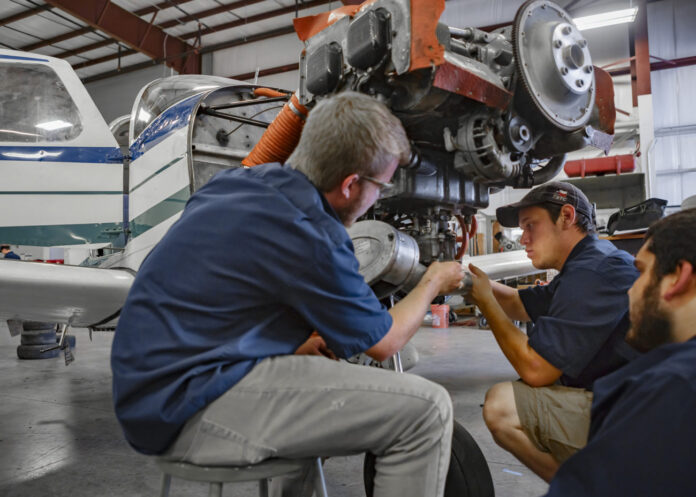By Amanda Sotelo, TSTC Staff
Texas State Technical College students are propelling themselves into great-paying careers by earning degrees in Aircraft Powerplant Technology.
They are entering an in-demand industry. According to the U.S. Bureau of Labor Statistics, Texas leads the nation in employment of aircraft mechanics and service technicians.
With just two additional semesters, students can increase their job readiness by also completing the TSTC Aircraft Airframe Technology degree.
TSTC Aircraft Powerplant Technology lead instructor Tom Cross explained how the program and college are working diligently to meet industry needs.
What is the length of the program?
The length of the Aircraft Powerplant Technology program is 12 months, or four semesters.
What can students expect when they graduate?
Students in Aircraft Powerplant Technology have two paths to choose from: a Certificate 2 or an Associate of Applied Science degree. Upon successfully completing the program, graduates are also prepared to take and pass their Federal Aviation Administration exam.
What skills do you learn in Aircraft Powerplant Technology?
Students will learn about electrical systems, engine overhauls, powerplant inspections, aircraft propellers and fuel metering.
What types of technologies are used to learn these skills?
Our program combines computer-based learning and hands-on learning on a variety of aircraft engines available in our two hangars.
How do these skills prepare students for the workforce?
This program prepares its students for FAA certification, which is required to work on aircrafts in the United States, and for any entry-level powerplant positions.
What kind of positions can a graduate of this program obtain?
A graduate of Aircraft Powerplant Technology can expect to work as an aircraft mechanic or a service technician. From a program with a 100% job placement rate, they can expect to work with companies such as L3 Technologies, Sun Valley Aviation, McCreery Aviation Co. Inc., Hunt Pan Am Aviation, Boyett Aviation LLC, and commercial airlines such as Southwest Airlines and United Airlines.





